Over the past few months, we have been exposed to various publications — both journalistic and research-based, from Lebanese as well as international sources — claiming that there is no real military purpose for Israel to hold on to the five geographic points inside Lebanese territory, near the border.
It is also claimed that Israel’s daily attacks on Lebanese territory weaken the Lebanese government and provides Hezbollah with an excuse not to give up its weapons. In addition, it is argued that Hezbollah, for its part, is showing patience, but continued Israeli escalation will lead to a response from it.
Warning / Deterrence / Intentions / Capabilities — four words that capture the essence of Israel’s lesson from October 7, 2023: Israel has learned that it cannot rely completely on receiving warning of actions against it, cannot rely on achieving deterrence over its enemies, and cannot be certain of its ability to interpret, analyze, and understand their intentions.
Israel faces enemies with an extreme religious ideology — such as Iran, Hezbollah, Hamas, and even a significant portion of the forces that make up Ahmad al-Sharra’s regime in Syria. Enemies of this kind will always have the ideology and motivation for “resistance” and for the destruction of Israel — and they possess both time and patience in abundance.
Israel, however, can analyze and assess capabilities — that is, what such enemies are potentially able to do and what their potential threat to Israel is. Based on this analysis and assessment, Israel can prepare militarily.
The five geographic points mentioned above constitute a central component of Israel’s military preparedness against the potential threat from Hezbollah.
These are five points located in strategic areas that hold topographical dominance over the surrounding geographic space — both on the Lebanese and Israeli sides — and they provide strong physical protection for the Israeli communities near the border.
Operationally — based on a comparative analysis we carried out, it is clear that all five points lie right in the heart of the Radwan unit’s infiltration routes that were planned to enable an incursion into the Galilee… Anyone who thinks Hezbollah’s motivation to penetrate Israeli territory in one way or another has vanished should think again.
On the psychological/perception front — for a change, residents of northern Israel near the Lebanese border do not wake up to see Hezbollah’s flag with Radwan unit fighters around it, controlling the area. They wake up and see the Israeli flag. Residents of the north understand that Hezbollah cannot, at present, carry out its original plan to invade the Galilee and stage a “northern October 7.”
Since the ceasefire agreement of November 27, 2024, and up to the time of writing these lines, Israel has carried out 600 strikes in southern Lebanon, in the Beqaa Valley, and in Beirut. Forty-eight percent of these strikes took place south of the Litani River, in the 1701 area.
These strikes were carried out against Hezbollah’s activities in general — and particularly against its reconstruction efforts, which violate the ceasefire agreement. The Lebanese state neither has the will nor the capability to genuinely confront Hezbollah. Anyone who thinks that Hezbollah will disarm or be disarmed is mistaken and misleading, and anyone who believes that Israel’s strikes give Hezbollah an “excuse” not to disarm is doubly mistaken and misleading.
“The ‘excuse’ is a deception. Hezbollah’s core and identity are armed resistance. The rifle on its flag is not decoration; it is a statement. From the words of Ibrahim al-Amin (editor of Al-Akhbar — Hezbollah’s mouthpiece) in November 2024, one can grasp the essence of Hezbollah’s core worldview: ‘The current confrontation is only another round in the war to destroy Israel. Hezbollah will rebuild itself and become stronger again.’
To these remarks one can add Hassan Nasrallah’s past words: ‘They will take our lives before they take our weapons… the weapon is a symbol of honor and pride…'”
And indeed, from the ongoing and close monitoring of events in Lebanon, it is plainly evident how Hezbollah — under Iranian patronage and with Iranian assistance — is working to rebuild its military capabilities (smuggling weapons and money, repairing and manufacturing weapons, recruiting and training operatives, restoring military infrastructure, refreshing operational plans, and more).
Hezbollah’s interest at the moment is to preserve, as much as possible, the continuity of its reconstruction and not to carry out moves against Israel that could cause significantly greater harm to those reconstruction efforts than the damage Israel is already inflicting. But let us not be mistaken Hezbollah currently has operational capability and, if it decides to, can launch offensive actions against Israel in various forms.
The term “patience,” as attributed to Hezbollah, stems from Hezbollah’s clear internal interest in focusing on military recovery — not from any display of “regional strategic responsibility.”
We invite anyone who wishes, is able, and is relevant to contact us and/or visit us in person at the Alma Center to receive a professional briefing — and even to tour along the border to see Israel’s security challenges in the north with their own eyes. In any case, you are welcome to visit our website and follow our publications on our various social media channels.

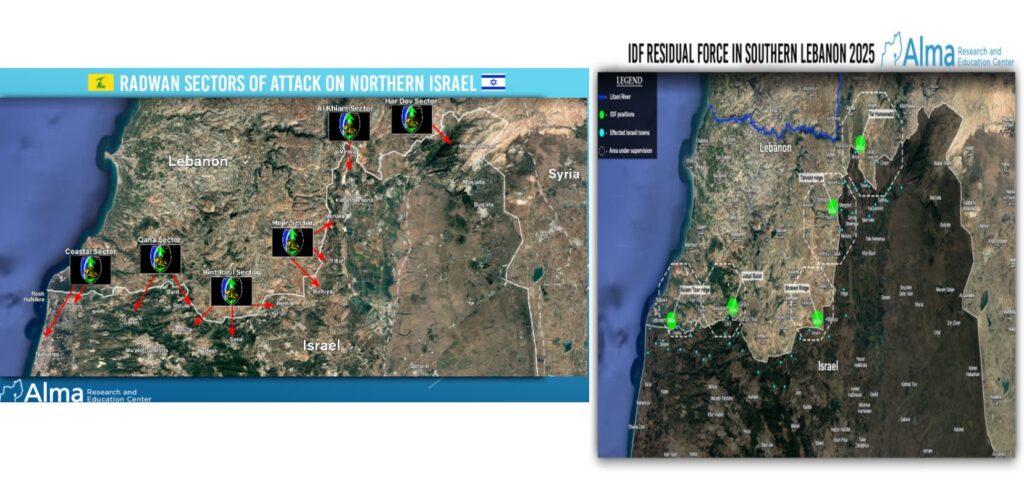

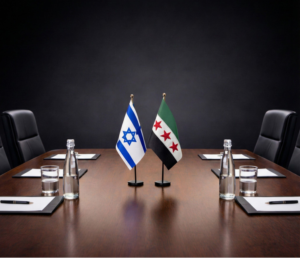
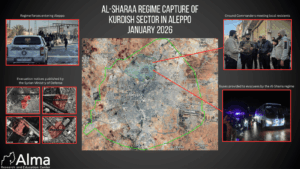
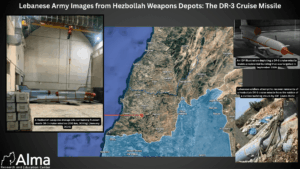
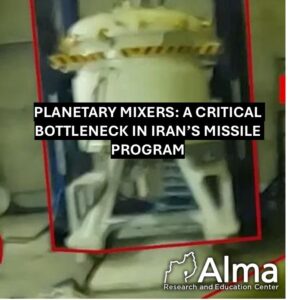
2 Responses
We must assure the other nations that our fight is with Hezbollah,Hamas,Iran etc. We are against tyrannical rulers not the people of Lebanon and we
would accept any help. For example strikes against hezbollah not against
Lebanon in the title followed by Boots on the grounds. The article describes
why Israel is there and why nations other than UNIFIL should be there.
Dear Tal,
If you will permit me, I would like to add a fifth word to tour list of October 7 lessons: Justice. Israel must execute Justice and eliminate the threats, or the consequences are perpetual conflicts with genocidal jihaddist terrorists. Align with God and complete your mission. “Proclaim Liberty Throughout All the Land unto All the Inhabitants Thereof”. Hamas executions on Gaza streets must be ended now and forever.